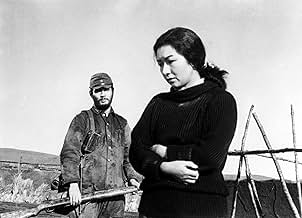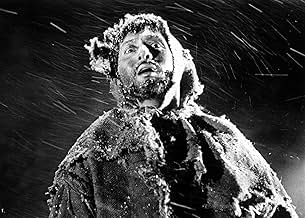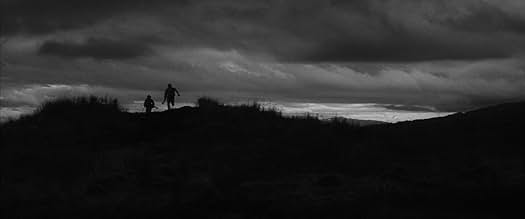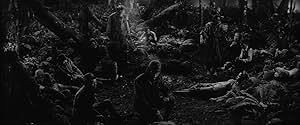La condizione umana: Parte III - La preghiera del soldato
Titolo originale: Ningen no jôken
VALUTAZIONE IMDb
8,8/10
8126
LA TUA VALUTAZIONE
Aggiungi una trama nella tua linguaHis ideals challenged by life as a conscript in war-time Japan's military, a pacifist faces ever greater tests in his fight for survival.His ideals challenged by life as a conscript in war-time Japan's military, a pacifist faces ever greater tests in his fight for survival.His ideals challenged by life as a conscript in war-time Japan's military, a pacifist faces ever greater tests in his fight for survival.
- Regia
- Sceneggiatura
- Star
- Premi
- 5 vittorie totali
Recensioni in evidenza
The last film in Kobayashi's epic trilogy picks up with Kaji (Tatsuya Nakadai) and a couple of his buddies trying to make their way through war-torn Manchuria and back to what they consider home. Their unit has been wiped out and while they're not sure if Japan has formally surrendered, they're well aware the its defeat is imminent. They are in danger from the Soviets who control the region, as well as armed peasant militia groups. They come across scattered Japanese civilians and try to help them as best they can, but struggle because food is incredibly scarce, and tough, no-win choices have to be made. They also come across small Japanese military who are attempting to continue the fight, which they want no part of.
As in the other films, the emotions are heart-wrenching, and this is one of the more powerful anti-war films you'll find. The cinematography is fantastic, the production quality is high, and the pace of the storytelling moves along well enough that the 190-minute runtime didn't feel like a burden, or as overwhelming as it may appear. That in itself is an achievement, considering the somber subject of the film.
Notable points for me:
As in the other films, the emotions are heart-wrenching, and this is one of the more powerful anti-war films you'll find. The cinematography is fantastic, the production quality is high, and the pace of the storytelling moves along well enough that the 190-minute runtime didn't feel like a burden, or as overwhelming as it may appear. That in itself is an achievement, considering the somber subject of the film.
Notable points for me:
- The recognition of rape during wartime, and in a broader sense, how vulnerable people like the elderly or farmers are forced to endure great hardship - and this comes from both enemy and friendly forces. The image of the women dumped out of a moving truck after having been raped is brutal.
- The thoughts of some of the characters being revealed in interior monologues. Kaji is haunted by the people he's seen die, the trauma he's endured, and the enemy soldiers he's killed, which he likens to murder. The flashbacks to earlier images are powerful reminders that people can't just walk out of these experiences unchanged. We also get a glimpse into the minds of his comrades, with one man thinking it would have been better had he died an honorable death on the battlefield, and another fearing how it will look for him, a superior to Kaji, being led by him. Even under such duress, the ego and concern about hierarchy spoke volumes about the male mind.
- The irony of ending up in a Soviet work camp, forced to do hard labor with minimal food, bringing the story full circle to when the Japanese had Manchurians in a similar camp in part one. One nation is on top one moment, oppressing another, and then the tide turns. We see this also in the Soviets proudly listening to their national anthem in the work camp, clearly patriotic and with a giant image of Stalin behind the commander, similar to the nationalism in Japan before the war.
- Similarly, the discussion between soldiers that the Soviets will not stay in Manchuria, which will result in a civil war between Chiang Kai-Shek and the communist Chinese under Mao Zedung. There is an implication that war begets war, and the cycle never seems to end.
- The disillusionment in one's ideals - and I don't mean the Japanese soldiers becoming disillusioned over the 'divine' Emperor's militarism, since that was present from the beginning of the story (though a younger soldier does go through an arc in that regard). I mean Kaji's communist sympathies getting a reality check when he finds that his Soviet captors have a "smug and selfish" attitude about them, which his friend chalks up to them taking a "Soviet-first policy," in stark contrast to communism's ideal of the worldwide proletarian.
- The attempts at communicating with the Soviet officers reflect this disillusionment, and also show how things lost in translation prevent communication. Kaji is at the mercy of a bad translator, and can't express the simple needs of his men or his personal views. Ironically, he's labeled a fascist by the Soviets, which is completely at odds with his beliefs.
- Life is broken down into its most elemental form, the need to eat, and will to survive. We see people desperate from hunger from the beginning of this film all the way through to the end. Pushed to extreme conditions, people become selfish, and sadly, empathy is scarce. Kaji tries to navigate these waters as best he can, treating people with dignity and holding on to his ideals, but there are limits to everything. One of the Japanese soldiers has become a collaborator to the Soviets, overseeing the prisoners like a kapo would for the Nazis, and contributes to the death of one of his friends. Kaji shows him no mercy as he beats him to death with a chain, and while there is something cathartic about that moment, it's such a contrast to the man we saw at the beginning of the first film - and sad to me that I felt myself urging him on.
- The ending, my god. Kaji tries to run away from the senseless violence of the world, realizing ideologies turn into fuel for warfare and oppression, and wants simply to return to the only thing that makes any sense in life - love - which is something that struck me at my very heart. With surreal imagery, Kobayashi gives us an ending that is extraordinary and indelible. He wanted it to be. The only way to avoid the cycle of war from repeating is to learn from the past, and that's what his trilogy is about.
The Human Condition 10 Hours Long 10 Hours Deep, Without a Doubt the Greatest Anti-War Statement Ever Made... What A Journey.
The Japanese troops are defeated by the Soviets and Kaji (Tatsuya Nakadai) heads with three survivors to South Manchurian expecting to meet his wife. Along their crossing through the enemy line in the Manchurian land, other Japanese survivors join Kaji's group, but they need to fight against the Chinese militias and the Soviets.
When they reach a Japanese village with women and one old man, a militia arrives in the place and Kaji and his men surrender to the Soviet to spare the women. The POWs are sent to a labor work camp and Kaji sees no difference between the treatment of the Japanese fascists and the Soviet communists, in which principles Kaji believed. He decides to escape from the camp to meet his beloved Michiko again.
"The Human Condition – Parts V & VI" is the last sequel of the heartbreaking anti-war masterpiece by Masaki Kobayashi. The story is impressively realistic and magnificently shot with top-notch camera work, giving the sensation of a documentary. I have seen many powerful movies about war, such as "Der Untergang", "Taegukgi hwinalrimyeo", "La Battaglia di Algeri", "Paths of Glory" and "Apocalypse Now" among others. But "The Human Condition" is certainly the most scathing antiwar movie that I have seen and I did not feel the 574 minutes running time in a black-and-white movie spoken in Japanese, Mandarin and Russian with English subtitles.
It is impressive to see the treatment spent by the fascist Japanese soldiers for the rookies and how Kaji grows-up and learns how his idealistic concept of communism is shattered when he becomes a POW and swaps his initial position of supervisor to the one of prisoner. The hopeless conclusion fits perfectly to this masterpiece and shows that in times of war, people are far from the condition for being human to survive. My vote is ten.
Title (Brazil): Not Available
When they reach a Japanese village with women and one old man, a militia arrives in the place and Kaji and his men surrender to the Soviet to spare the women. The POWs are sent to a labor work camp and Kaji sees no difference between the treatment of the Japanese fascists and the Soviet communists, in which principles Kaji believed. He decides to escape from the camp to meet his beloved Michiko again.
"The Human Condition – Parts V & VI" is the last sequel of the heartbreaking anti-war masterpiece by Masaki Kobayashi. The story is impressively realistic and magnificently shot with top-notch camera work, giving the sensation of a documentary. I have seen many powerful movies about war, such as "Der Untergang", "Taegukgi hwinalrimyeo", "La Battaglia di Algeri", "Paths of Glory" and "Apocalypse Now" among others. But "The Human Condition" is certainly the most scathing antiwar movie that I have seen and I did not feel the 574 minutes running time in a black-and-white movie spoken in Japanese, Mandarin and Russian with English subtitles.
It is impressive to see the treatment spent by the fascist Japanese soldiers for the rookies and how Kaji grows-up and learns how his idealistic concept of communism is shattered when he becomes a POW and swaps his initial position of supervisor to the one of prisoner. The hopeless conclusion fits perfectly to this masterpiece and shows that in times of war, people are far from the condition for being human to survive. My vote is ten.
Title (Brazil): Not Available
Ningen no jôken is a masterpiece film but is also painful to watch most of the time. Nonetheless, it is a tour de force to be lauded for its direction, cinematography and acting at every turn. Most of those commenting in previous discussions mention the virulent anti-war sentiment of the film which is abundantly evident. It was interesting that much of the film is autobiographical, inspired by Kobayashi's war experiences. He too refused to be an officer when he qualified, and stayed a private throughout the war. An interesting point came up when I was watching the fourth DVD in the Criterion edition of The HumanCondition which is a series of three insightful interviews. During his comments the director Masahiro Shinoda mentioned that he thought at the time, the romantic love Kaji had for his wife, Michiko, was overly sentimental and unrealistic. He thought that it was due to the fact that Kobayashi and his peers were born of another age whose romanticism was the norm and unsullied by his generation's sobering war experience. He said that he had also consulted the internet to see the opinions of the film among contemporary young people in Japan today, and found that they too, thought the love unrealistic. He felt the love should have been more erotic and less idealized. The remarks of another commentator solidified my opinion of this issue about Kaji's love. That writer stated that the title really means more like "condition for being human." This confirmed my opinion that Kobayashi's point of the film is that what makes one human, in the best sense of the word, is love. Otherwise we devolve into some type of cruel bestiality found in the phrase 'man's inhumanity to man.' This inhumanity is evident throughout the film, whether in the sadism of the other Japanese soldiers, the cruelty of the guards to the Chinese prisoners, or in the malice of the of the Russian overseers. However, the Kaji character is set apart: he sticks to his ideals, he is humble, he displays selflessness as seen when he gives his food to another or when leading the men and puts them ahead of himself. He is a type of everyman whose being is elevated above merely satisfying physical needs and responding to base instincts. He remains an ennobled human not a saint above the fray, but his love gives him the will to live, to continue on and to even do good when surrounded by evil. Love is the condition for being human.
Lo sapevi?
- QuizIs the first Japanese movie in stereo.
I più visti
Accedi per valutare e creare un elenco di titoli salvati per ottenere consigli personalizzati
- How long is The Human Condition III: A Soldier's Prayer?Powered by Alexa
Dettagli
- Data di uscita
- Paese di origine
- Lingue
- Celebre anche come
- The Human Condition III: A Soldier's Prayer
- Luoghi delle riprese
- Rishiri-Rebun-Sarobetsu National Park, Hokkaido, Giappone(The final scene was shot on the Sarobetsu Plain.)
- Aziende produttrici
- Vedi altri crediti dell’azienda su IMDbPro
- Tempo di esecuzione3 ore 10 minuti
- Colore
- Proporzioni
- 2.35 : 1
Contribuisci a questa pagina
Suggerisci una modifica o aggiungi i contenuti mancanti































